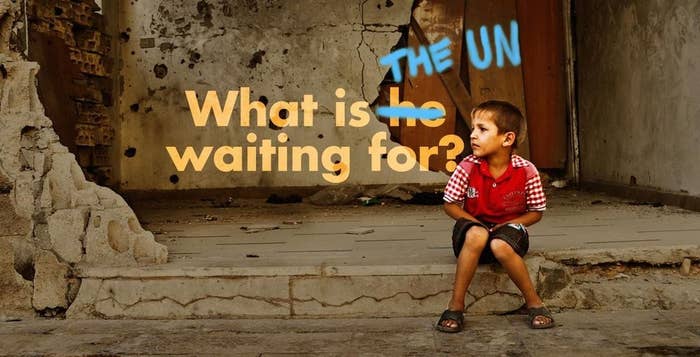
UN trucks full of food and medicine are just across the border from millions of Syrians that need them. The UN is divided over a legal technicality on whether to let the trucks in or not. We're calling on people from around the world to come together and ask them to drive.
The UN is waiting for the Syrian regime's written permission to enter -- permission that could never come. But because the Syrian authorities are arbitrarily denying access, top legal minds and governments say that the UN doesn't need to wait for their consent. It's now up to five people to say go: the heads of Unicef, UNHCR, the World Food Programme, OCHA and WHO.
Here's a little bit of information about the situation, and why we believe they could be doing more.
1. Wait, aren't the UN already in Syria?
Yes. The UN is operating in Damascus and reaching millions of people - but only in certain areas and those are mostly controlled by government forces. Leaked UN documents last week showed that 92% of UN food is going to government-controlled areas only.
This basically says that the government controlled areas are currently getting pretty much all of the UN aid.
But there's millions more on both sides of the conflict who are completely cut off from this aid - mostly in the north of the country. If the UN were to cross borders, they would potentially reach over 3 million people in this part of the country. The unwritten rule is if you operate in Damascus, you can't operate across the border - it's an either/or choice that is leaving millions without food. The UN has a duty to give food to all who need it, regardless of where they live in the country.
2. Why does the UN need permission? And who from?
It's an international law thing. It only applies to the UN, non-governmental organisations don't need it. Sometimes consent is temporarily denied for valid and legal reasons - for example a party might refuse consent if some sort of military action is happening in a territory or if it thinks the UN is being used to smuggle weapons. However, under international law a party cannot deny access to humanitarian aid as a tactic to weaken the enemy or cause harm to its citizens. When this access is denied for no reason, international law experts say that the UN can go ahead and deliver the food and medicine.
3. What the hell is 'arbitrary denial'?
Great question - it was a new one to us as well. Arbitrary denial is when a party refuses the UN consent to enter a country for no valid reason. Because Assad is arbitrarily denying access, top legal minds and governments are saying that the UN does not need to wait for its consent to enter.
4. Who can make this happen?
It's now up to five people to say go: the heads of Unicef, UNHCR, the World Food Programme, OCHA and WHO. They don't need to wait for permission from the UN Security Council. In fact some members of the UNSC are pushing them to drive.
5. Has anyone driven across the borders?
Yep. The Turkish border in the north is crossed regularly by smaller organisations. The UN managed to cross that one too in a much publicised - but let's be honest, tiny - convoy. Just last week the Red Crescent delivered trucks of food.
6. Why now?
So there was a big turning point a few weeks ago when Valerie Amos (Head of OCHA + the UN person on Syria) came out publicly and called a spade a spade, labelling Assad's action as arbitrary denial and urged the international community to "consider alternative forms of aid delivery, including cross-border operations," to access the most needy population in rebel-controlled areas of Syria.
It's hard to convey how big a deal this was. Even though everyone knew this was happening, it's a very difficult thing to prove, and as such, very difficult for people to comment publicly on. But now we've heard the Head of OCHA saying this to the UN Security Council and the world's media, we have a turning point and a huge opportunity.
7. Is it dangerous?
The UN isn't divided over safety. Of course every individual operation needs to be assessed for safety -- nobody is calling on UN staff to take more risks on the ground. This is about UN bosses being bolder with the legal advice and to stop waiting around for unnecessary consent that may never come.
8. How much aid are we talking about?
The short answer is a lot. A bit of basic maths could lead us to say that new access to some 3.3 million would equate to something like 660,000 family rations being delivered.
9. Who will it reach?
Figures differ from agency to agency and are constantly being updated, but it's hard to overestimate the impact this could have. According to the most recent report from the UN, last month cross-border aid from Turkey could reach 3.5 million, and another 400,000 from Jordan. Due to difficulties with access in March, World Food Programme was only able to reach less than half (4.1 million) of the 9.3 million in need of humanitarian assistance (which is only 44%, meaning that 5.2 million in need are not receiving food supplies from WFP).
Whatever data set you use, there's no disagreement that cross border could have a dramatic impact in the lives of millions.
10. I'm sold. What can I do to make this happen?
Great. We think it's a no-brainer too. The best thing you can do is head over to our petition asking the UN to drive the trucks in. And when you're done, tell your friends, family, people you know, people you don't know

